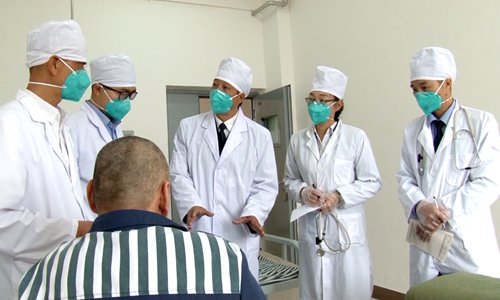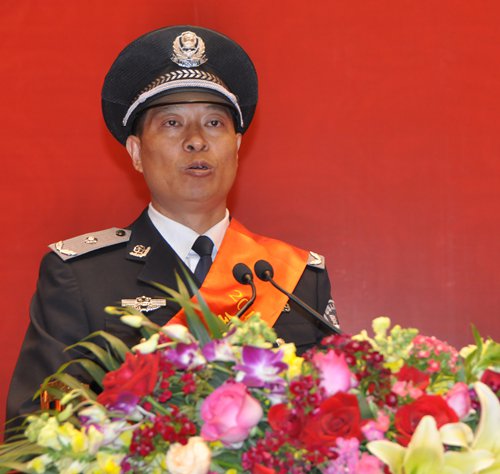HOME >> CHINA
Doctor-officer takes pride caring for HIV/AIDS prisoners
By Hu Yuwei in Yunnan Source:Global Times Published: 2019/7/11 20:03:40

Tang Shunbao (Center) makes the rounds of wards for HIV-affected inmates. Photo: Courtesy of Jianshui Prison Hospital
The custom-made uniform is now too large for Tang Shunbao, 53, a prison doctor. Gallbladder cancer has made him lose 16 kilograms over the past few months, and left his arms looking like a 10-year-old's, saddening many prisoners who have previously been treated by him.
For the past 18 years, Tang has been the head of Jianshui Prison Hospital, Southwest China's Yunnan Province, and has devoted all his energy to caring for prisoners with HIV/AIDS. The majority of patients admitted to the hospital are from the Eighth Prison yard, an isolated prison area exclusively for HIV/AIDS prisoners.
This group, who most people tend to be frightened by, are the ones who Tang works for every day and night.
In 2018 alone, the medical team led by Tang Shunbao treated hundreds of criminals with HIV/AIDS.
In his wife's words, Tang has been on the brink of AIDS for nearly two decades, referring to two serious incidents in which he was exposed to this disease.
Terrifying moment
Back in 2010, Tang suffered one of his worst occupational exposures to HIV as he was imprisoning an HIV-positive criminal.
Along the way, the criminal surnamed Ao suddenly suffered an AIDS-related encephalopathy and began vomiting, banging his head against the glass and pounding the car window.
Tang's white coat was immediately covered with vomit and soaked in blood. Without regard for his own safety, Tang tried to control the prisoner to prevent him from further hurting himself.
HIV is spread mainly through certain body fluids, such as blood, semen, and breast milk, from a person who has HIV.
His wife, a nurse who was with him at the time, opened a bottle of coke and tried to rinse the blood off immediately.
Ao died shortly after returning to Jianshui Prison due to serious AIDS complications, leaving Tang suffering from insomnia due to feeling helpless over his death.
Although he has been in this job for decades, seeing someone die due to a collapsed immune system has always been a wretched experience.
"I dread to hear a midnight knock at the door, because it must mean someone is critically ill," Tang told the Global Times. For Tang, every life he is unable to save leaves him frustrated, whether the patient is a criminal or not.

Tang Shunbao Photo: Courtesy of Jianshui Prison Hospital
Pioneering work
In 2008, Jianshui Prison was the first to set up a special HIV/AIDS prison zone, amid existing public fear over AIDS, with a pilot program to centralize the treatment of HIV/AIDS prisoners from all over the province. Tang recalls the early days of his career as being the toughest.
"At that time, the prison area was a wasteland, with very poor facilities. There was great psychological pressure because there were so many AIDS patients and no management experience to learn from," he said.
Ten years on, there are nearly 10 times as many prisoners here as there were when the isolated prison area was first established. Many of them are major criminal offenders, doomed to serve life sentences while battling AIDS.
"Serving hundreds of AIDS criminals together in a cell feels like a group of people sitting on a powder keg," Yin Tao, another officer in the specialized prison area, told the Global Times.
"Frankly, I was scared of this particular group at the beginning, but someone has to take over the treatment. I have to be the one," Tang told the Global Times.
Since then, Tang has personally checked the inmates' physical conditions, made intravenous injections and collected blood samples from them every day.
While many try to avoid working with this special group, Tang applied for his wife to come and work with him. Whenever there was a serious wound to be treated, he administered the medicine himself, refusing to let the younger doctors do it.
Dual care
A prison term is longer than your life - this is a saying widely heard among prisoners with HIV/AIDS. Most of them are pessimistic and give up on life, and some even hurt themselves, said Yin.
In the Eighth Prison yard, many HIV/AIDS-affected inmates refuse to take antiviral drugs because they don't believe the treatment will work. Tang produces his own promotional materials and goes to the ward on a monthly basis to tell them about the effectiveness, using scientific data to back his case.
"I was asked if it was worth the effort to save the lives of criminals. I never thought about it. I just knew it was my job to save lives. For me, being a doctor and an officer are two very noble careers," he said.
Kui, 53, who is in prison for drug trafficking, had festering feet due to severe phlebitis, and has been unable to walk for a long time. When he arrived at the prison hospital, the stench from his feet filled the corridor, attracting flies and bugs and leaving his roommates unable to eat.
"I didn't think there would be a prison that would accept me in such a difficult situation, as the hospital had already suggested having my legs amputated. When I first went to prison, I thought I would not live longer than half a year. I was so desperate that I tried to kill myself by piercing my ear with the long screw on my crutch," Kui told the Global Times.
"But Tang never gave up on me. He came every day to personally change my dressing, clean my wound, and constantly encourage and comfort me," he said.
A year on, his condition has improved greatly and he is now able to walk. He also has renewed confidence in being able to conquer AIDS.
"I thought I was an outcast, but when I came in, I found I wasn't," said Kui.
Sticking to his post
Tang was diagnosed with gallbladder cancer last August. In the days before he was sent for treatment, he walked with great care for fear that his gallbladder would be shattered. His ruptured gallbladder kept him awake late at night for the whole week before his surgery.
While Tang was on sick leave, many people talked about him, saying they missed him and thinking that he would not be coming back.
"If I were him, I would have used my illness as an excuse to leave the post for sure," Yin told the Global Times.
But to everyone's surprise, Tang returned.
Almost all of the prison officers who work here have wanted to leave more than once, due to concern from their families or discrimination from society because of their proximity to HIV/AIDS patients.
But Tang is different. For him, being a doctor and a prison officer is an act of faith.
"I was born with these two identities," Tang told the Global Times.
Newspaper headline: Tending to the sick
RELATED ARTICLES: